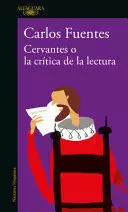
FUENTES, CARLOS
u003cbu003e«Don Quijote, el loco, está loco no sólo porque ha creído lo que ha leído. También está loco porque cree, como caballero andante, que la justicia es su deber y que la justicia es posible.»u003cbru003eu003c/bu003eu003cbru003e Desde u003ciu003eZona sagradau003c/iu003e hasta u003ciu003eTerra Nostrau003c/iu003e, la narrativa de Carlos Fuentes oscilaba entre la sobriedad en el relato y la obra como una broma que asaltaba la realidad para trastocarla. En su discurso de ingreso en El Colegio Nacional hizo ver la similitud de obras totalizantes, como u003ciu003eDon Quijote de la Manchau003c/iu003e de Miguel de Cervantes y Finnegans Wake de James Joyce. Discurso que se extiende, retrocede y avanza en estos ensayos que incitan a revisar y releer éstas y otras obras que rompen la realidad e inventan una nueva, alterna y paralela, pero llena de rebelión, que resaltan sus características y nos hacen ver el mundo con otros ojos; por ejemplo, el Quijote desde antes de ser escrito, revisado en su época y a lo largo de su existencia, en su España árabe y judía y ya contaminada del Nuevo Mundo, con sus personajes reales y ficticios que salen de otros libros y asaltan otras literaturas. Una incitación a la lectura rebelde, y a rebelarse, con una fantasía que es mejor y más vital que cualquier realidad posible.u003cbru003e u003cbru003e u003cbu003eENGLISH DESCRIPTIONu003c/bu003eu003cbru003e u003cbru003e u003cbu003eDon Quixote, the madman, is mad not just because he believes what he reads. He is also mad because, as a knight errant, he believes that justice is his duty, and that justice is possible."u003c/bu003eu003cbru003e u003cbru003e From u003ciu003eZona Sagradau003c/iu003e to u003ciu003eTerra Nostrau003c/iu003e, Carlos Fuentes's works range from sober narration to playful and disruptive assaults on reality. In his speech upon acceptance into Mexico's National Academy, he pointed to the similarities between all-encompassing works such as Miguel de Cervantes's u003ciu003eDon Quijote de la Manchau003c/iu003e and James Joyce's u003ciu003eFinnegans Wakeu003c/iu003e. Here, Fuentes expands, retreats, and delves further into these themes, encouraging us to re-read these and other works that break with reality and create new, alternate and parallel universes. These creations are a form of rebellion that urge us to see the world through other eyes, he argues. Don Quixote is one such work; revised in its time and over the centuries, it is set in an Arab and Jewish Spain already tainted by the New World, with real and fictitious characters that emerge from other books and wage war on other literatures. Fuentes invites to join him in his rebellious reading of these texts, which offer fantasies that are better and more vital than any possible reality